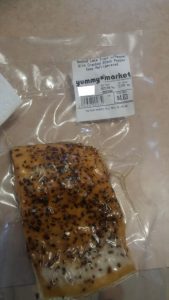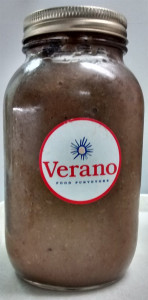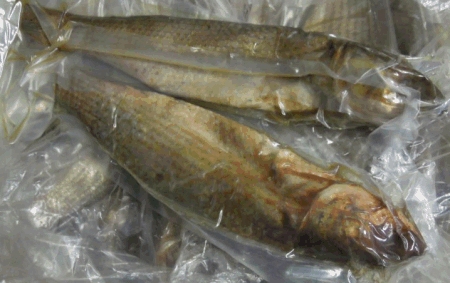I was food shopping at Coles, one-half of the supermarket duopoly in Australia, and an announcement came over through the normal background music of 1980s punk – I’m sure The Clash aspired to have London Calling played as muzak in a grocery store full of old people – that smoked (farmed) trout was being introduced.
 Trout is the only aquaculture species in Ontario (that’s in Canada), so I knew my friend Steve would be pleased.
Trout is the only aquaculture species in Ontario (that’s in Canada), so I knew my friend Steve would be pleased.
Except when the trout carries botulism because of lousy processing.
Yummy Market Inc. is recalling Yummy Market brand Smoked Lake Trout w/Pepper with Cracked Black Pepper from the marketplace because it may permit the growth of Clostridium botulinum. Consumers should not consume the recalled product described below.
The following product has been sold from Yummy Market – 1390 Major Mackenize Drive W, Maple, ON
If you think you became sick from consuming a recalled product, call your doctor.
Food contaminated with Clostridium botulinum toxin may not look or smell spoiled but can still make you sick.
This recall was triggered by a consumer complaint. The Canadian Food Inspection Agency (CFIA) is conducting a food safety investigation, which may lead to the recall of other products. If other high-risk products are recalled, the CFIA will notify the public through updated Food Recall Warnings.
The CFIA is verifying that industry is removing recalled product from the marketplace.
There has been one reported illness that may be associated with the consumption of this product.



.jpeg) botulinum.Toxins produced by this bacteria may cause botulism, a life-threatening illness.
botulinum.Toxins produced by this bacteria may cause botulism, a life-threatening illness.
.jpg)

 I didn’t know French people had discovered enchiladas, and much less those you can buy in the grocery store. That’s one food I often crave when traveling for an extended period in France, and it’s my standby order at my first visit to any Mexican restaurant. But obviously someone in France is buying enchiladas because two people are now reported in serious but stable condition in a French hospital after eating Companeros brand chicken enchiladas. Several of the
I didn’t know French people had discovered enchiladas, and much less those you can buy in the grocery store. That’s one food I often crave when traveling for an extended period in France, and it’s my standby order at my first visit to any Mexican restaurant. But obviously someone in France is buying enchiladas because two people are now reported in serious but stable condition in a French hospital after eating Companeros brand chicken enchiladas. Several of the .jpg)